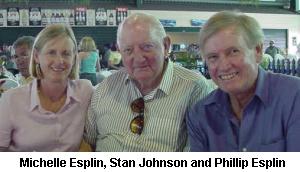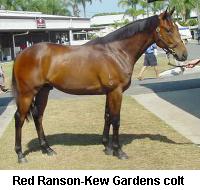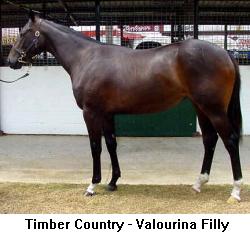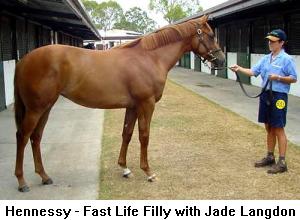| After nearly
two decades helping to establish substantial thoroughbred breeding operations for other
people, Phillip Esplin is determined to "turn Twin Palms into the leading broodmare
farm in the country". His Twin Palms Stud at
Lochinvar in the Hunter Valley, is a leading vendor by average at the Conrad Jupiters
Magic Millions sale. From only 5 lots entered, Twin Palms sold all of them at an average
price of $168,200. The top 3 were :-
- Lot 24 by Red Ransom from Kew Gardens $320,000
- Lot 222 by Encounter from Queen Bellotto for $130,000
- Lot 395 by Timber Country from Valourina for $310,000
In each case the Twin Palms horse sold for a price well
over the average for the stallion and in some cases 200 or 300% higher. Clearly Twin Palms
is well on the way to achieving its objective in the highly competitive world of
thoroughbred breeding, where the large foal crops produced by popular stallions sometimes
have the effect of reducing prices due to over supply.

Esplin is relaxed about the over supply problem, saying
that "we don't care about competition in the market". If he has a concern, it is
to do with stud masters overcommitting stallions so that they are covering 4 or even 5
mares in a day. "It's aggravating for a stud to expect me to take a very valuable
mare to a stallion thats also serving poor quality mares just to get numbers on the
ground." He went on to say that "the first stud that announces the size of a
stallion's book at the start of the season will get our business".
 A corporate lawyer by profession, Esplin's start
in the thoroughbred breeding business came when he and his legal practise partner Brian
Agnew started Wakefield stud in 1981. Together they were responsible for standing
stallions like Kala Dancer and Rancher at stud. A corporate lawyer by profession, Esplin's start
in the thoroughbred breeding business came when he and his legal practise partner Brian
Agnew started Wakefield stud in 1981. Together they were responsible for standing
stallions like Kala Dancer and Rancher at stud.
Esplins legal expertise led to him being invited by
stockbroker John Messara to become a founding director of Arrowfield Stud in 1985. Upon
Arrowfield undergoing a capital reconstruction in 1987 and becoming a publicly listed
stud, Esplin found that his duties with Arrowfield and joint ownership of Wakefield
produced a potential conflict of interest. Consequently he sold out of Wakefield and a
year or so later formed his own legal firm, Esplins.
By the early 1990's the "recession we had to
have" was taking its toll on business generally and the thoroughbred industry was
hard hit with a number of breeders and studs going out of business. The failure of
Arrowfield's financier Tricontinental, meant that its ability to take advantage of
available opportunities was limited.
Esplin decided to set up Twin Palms on land owned by long
time client Stan Johnson at Lochinvar in the Hunter Valley. Originally owned by the
Penfolds wine company, the land had previously been used as an experimental vineyard.
Johnson was persuaded to purchase some of the high quality mares which came onto the
market during the early 1990's such as Bold Promise. Together with mares owned by Esplin,
the Twin Palms broodmare farm became a reality.
 By 1996, it was becoming increasingly
obvious that a public company structure was inappropriate for a thoroughbred stud such as
Arrowfield and Esplin advised Messara on the most effective method to return Arrowfield to
private ownership. In the process he put himself out of a job, resigning as a director of
Arrowfield in 1997. By 1996, it was becoming increasingly
obvious that a public company structure was inappropriate for a thoroughbred stud such as
Arrowfield and Esplin advised Messara on the most effective method to return Arrowfield to
private ownership. In the process he put himself out of a job, resigning as a director of
Arrowfield in 1997.
Free to concentrate on his own breeding operation, Esplin
has spent the period since developing the Twin Palms broodmare band with acquisitions both
within Australia and from overseas. Esplin says he is "motivated by breeding a good
horse" and shuns fashion as the sole determination of which stallions he sends his
mares to.
The Twin Palms policy is to "walk-in" mares for
service, which means that the whole Hunter Valley is available for stallion selection.
Esplin seems happy to choose from the wide selection of stallions. "We sold 12
yearlings at the Easter sales last year and they were all by different stallions".
His stallion selection method does not rely on any one criteria such as pedigree analysis,
but combines several different factors.
As Esplin says "there is a state of mind beyond
logical analysis ie judgement". His policy is to "slavishly follow my own
judgement" rather than be guided solely by what others think.

Clearly Esplin's judgement is working well, because Twin
Palms have produced no fewer than 4 stakes performers this season alone. His above average
results in the sale ring demonstrate that the market is prepared to pay for the Twin Palms
product. Could it be that in an industry where recognition usually takes decades, Twin
Palms is already realising Esplin's ambition? |